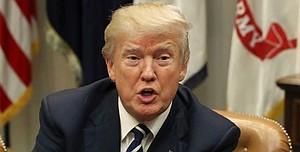4/25/2018

By Ariane de Vogue, CNN Supreme Court Reporter
(CNN) -- Most of the attention at Wednesday's dramatic Supreme Court hearing will center on President Donald Trump's travel ban, but a second major legal issue lurks in the case that could affect future White House occupants as well: the propriety of federal courts issuing nationwide injunctions that can bring a president's policy goals to a screeching halt.
In the case at hand, a district judge in Honolulu issued an injunction barring all enforcement of the travel ban, then the 9th US Circuit Court of Appeals narrowed the injunction, but the Supreme Court issued an order allowing the entire travel ban to go into effect pending appeal.
Now, as the government asks the justices to rule on the legality of the ban, it is also asking them to hold that the district court injunction was "impermissibly overbroad."
The justices do not have to reach the issue in the case, but court watchers are eager to see if any of the justices are interested by the question and could decide to shed light on whether courts should limit the relief to the parties before them.
Nationwide injunctions are a relatively new phenomenon but they have had a big impact on Trump's policies, most notably in regard to the travel ban as well as the President's bid to keep federal funds from so-called "sanctuary cities," jurisdictions that have policies designed to limit cooperation with federal immigration efforts.
The administration is clearly troubled by the trend.
Earlier this month, Assistant Attorney General Beth Williams gave a speech at the American Bar Association noting that there were no examples of nationwide injunctions before 1963 and that by Justice Department estimates, the courts issued an average of only 1.5 nationwide injunctions per year against the Reagan, Clinton and George W. Bush administrations and 2.5 per year against the Obama administration.
But in Trump's first year, she said, "judges issued a whopping 20 nationwide injunctions -- an eightfold increase."
The enormous uptick matches the entire eight-year total under the Obama administration and should "draw alarm," Williams said. The use of the injunctions "strikes at the heart of our democratic system" and allows "unelected judges to second-guess the domestic policy and national security decisions of our elected officials."
Stephen Vladeck, CNN's Supreme Court analyst and a law professor at the University of Texas School of Law, believes that courts might simply be reacting to the breadth and novelty of some of Trump's policies.
"One can't have a conversation about the uptick of nationwide injunctions without having a conversation about the novelty of the policies being enjoined," he said.
In the case at hand, the 9th US Circuit Court of Appeals held that a nationwide injunction concerning a third version of the ban was appropriate because "piecemeal" relief would "fragment immigration policy."
But the court said a "worldwide" injunction would be inappropriate and extend too broadly. It permitted the ban to go into effect for those without bona fide connections to people or entities in the United States.
Neal Katyal, arguing Wednesday's case for the challengers, says the district court injunction was the proper remedy because it ensured that the immigration system is "uniform" and because a targeted injunction "would create a fragmented immigration system" in violation of constitutional mandates.
Solicitor General Noel Francisco, on the other hand, argues that courts' preference for "uniform enforcement" cannot justify "barring enforcement of huge swaths" of the ban based on injury to "at most a handful of individuals."
"Many of the current critics of nationwide injunctions, such as Attorney General Jeff Sessions, were supporters of the very same relief when it was used to block controversial policies pursued by President Obama," Vladeck said. "That's why I'd be surprised if the justices went out of their way to foreclose these kinds of orders across the board even if they think the courts erred in this case."
